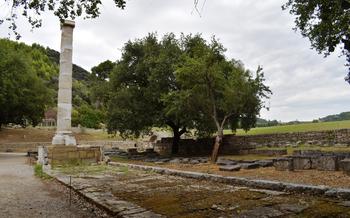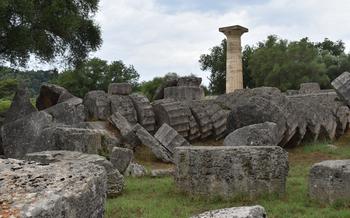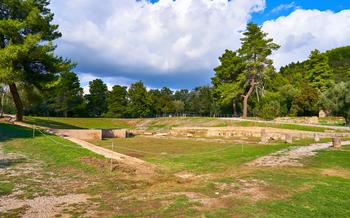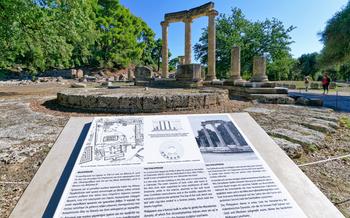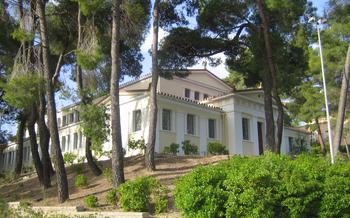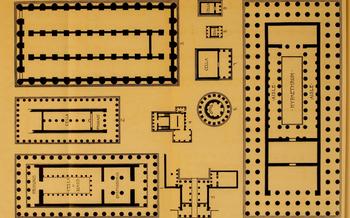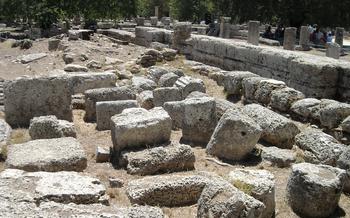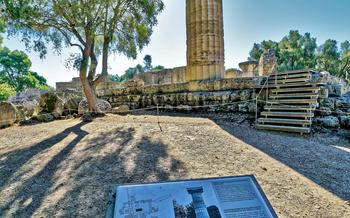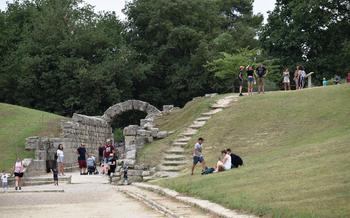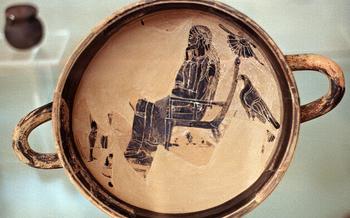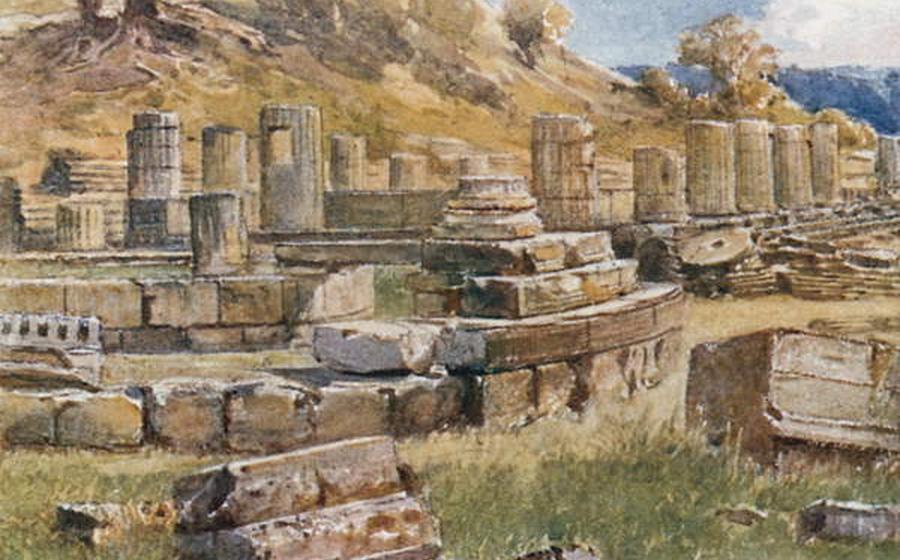
Hill of Kronos
- A Journey to Ancient Glory: Unveiling the Hill of Kronos
- Exploring the Archaeological Treasures: A Walk Through Time
- The Temple of Zeus: A Majestic Symbol of Divinity
- Witnessing the Ancient Olympic Games: A Thrilling Spectacle
- Admire the Sculptures: Masterpieces of Ancient Greek Art
- Exploring the Museum: A Treasure Trove of Discoveries
- Kronos Hill's Enchanting Views: A Panoramic Delight
- The Archaeological Site: A Journey into Antiquity
- In the Footsteps of Hercules: The 12 Labors
- The Hill's Natural Beauty: A Serene Escape
- Tips for a Memorable Visit: Plan Your Adventure
- Capture the Moment: Photography Enthusiasts' Delight
- Insider Tip: Uncover Hidden Gems
A Journey to Ancient Glory: Unveiling the Hill of Kronos
In the heart of Greece, nestled amidst the lush landscapes of Peloponnese, lies the Hill of Kronos, a treasure trove of ancient wonders that has captivated the imagination of historians, archaeologists, and travelers alike. Steeped in mythology and historical significance, this sacred site offers a glimpse into the glorious past of Greece, where legends unfolded, and civilizations thrived.
Archaeological excavations conducted on the hill have unearthed a wealth of artifacts, shedding light on the rich cultural heritage of the region. From ancient temples and theaters to intricate sculptures and pottery, the discoveries made here have provided invaluable insights into the lives and beliefs of the people who once called this place home.
Despite the passage of time, the Hill of Kronos continues to emanate an aura of grandeur and mystery, inviting visitors to embark on a journey through the annals of history and explore the captivating stories that linger within its ancient walls.
Exploring the Archaeological Treasures: A Walk Through Time
Venturing through the Hill of Kronos unveils a treasure trove of archaeological wonders that transport visitors back to the era of ancient Greece. Among the notable ruins, the Temple of Zeus stands as a testament to the grandeur of Greek architecture. With its imposing columns and intricate carvings, it offers a glimpse into the religious beliefs and practices of the ancient Greeks. The Altar of Zeus, where the Olympic flame was once lit, is another significant site that evokes the spirit of the ancient Olympic Games.
Other architectural marvels include the Gymnasium and Palaestra, where athletes trained and prepared for the competitions. The Stadium, where the Olympic Games were held, is a reminder of the athletic prowess and competitive spirit that defined this ancient sporting event. Ongoing excavations continue to reveal new insights into ancient Greek life, uncovering artifacts, structures, and inscriptions that shed light on their daily lives, customs, and beliefs.
The Temple of Zeus: A Majestic Symbol of Divinity
Among the ruins of Olympia, the Temple of Zeus stands as a testament to ancient Greek architectural prowess and religious devotion. Constructed in the 5th century BC, this colossal temple was dedicated to the king of the gods, Zeus, and served as the centerpiece of the sacred precinct.
The temple's grandeur is immediately apparent, with its massive Doric columns soaring towards the sky. Each column, standing over 10 meters tall, exudes strength and stability, supporting the weight of the temple's massive pediments and entablature. The intricate carvings adorning the capitals and metopes depict scenes from Greek mythology, adding a touch of artistry to the temple's imposing presence.
Inside the temple, a colossal statue of Zeus once stood, crafted from ivory and gold by the renowned sculptor Phidias. This awe-inspiring statue, considered one of the Seven Wonders of the Ancient World, depicted Zeus seated on his throne, radiating power and majesty. Though the statue no longer exists, its legacy lives on, inspiring awe and wonder in visitors who can still sense the divine presence that once filled this sacred space.
Witnessing the Ancient Olympic Games: A Thrilling Spectacle
The Hill of Kronos was not only a religious sanctuary but also the birthplace of the ancient Olympic Games, one of the most significant athletic and cultural events in the ancient world. According to Greek mythology, the first Olympic Games were held by Hercules as part of his 12 labors. The games were dedicated to Zeus, the king of the gods, and were held every four years.
The ancient Olympic Games featured a variety of athletic competitions, including running, wrestling, boxing, and chariot racing. The games were not only a celebration of athletic prowess but also a time for cultural exchange and diplomacy among the different city-states of Greece.
During the games, a sacred truce was declared, and all wars and conflicts were suspended. This allowed athletes from all over Greece to compete in the games without fear of attack. The games were also a time for religious ceremonies and rituals, and athletes would often make sacrifices to Zeus and other gods in hopes of winning.
The legacy of the ancient Olympic Games is still felt today. The modern Olympic Games, which began in 1896, are directly inspired by the ancient games and share many of the same ideals, such as sportsmanship, fair play, and international cooperation.
Admire the Sculptures: Masterpieces of Ancient Greek Art
Among the many treasures found at the archaeological site of Kronos Hill, the sculptures stand out as remarkable examples of ancient Greek artistry. These intricate works of art, carved from marble or bronze, depict gods, goddesses, heroes, and mythical creatures with exquisite detail and realism.
One of the most famous sculptures is the Hermes of Praxiteles, a marble statue that captures the god Hermes in a moment of repose. The statue's graceful posture, gentle expression, and intricate drapery folds showcase the exceptional skill of Praxiteles, one of the most renowned sculptors of ancient Greece.
Another notable sculpture is the Nike of Paeonius, a bronze statue that depicts the goddess of victory, Nike, poised to take flight. The statue's dynamic composition, powerful musculature, and intricate details convey a sense of movement and energy that is both awe-inspiring and captivating.
These sculptures, along with many others found at Kronos Hill, offer a glimpse into the artistic and cultural achievements of ancient Greece. They provide valuable insights into the religious beliefs, mythological narratives, and aesthetic sensibilities of this remarkable civilization.
Moreover, the sculptures at Kronos Hill have had a profound influence on the development of Western art. Their realistic style, attention to detail, and harmonious proportions served as models for later artists, including those of the Renaissance and Baroque periods.
Today, these ancient masterpieces continue to captivate and inspire visitors from around the world, standing as a testament to the enduring legacy of ancient Greek art and its contributions to our cultural heritage.
Exploring the Museum: A Treasure Trove of Discoveries
Within the confines of the museum, a treasure trove of artifacts awaits the curious visitor. These relics, unearthed from the very soil of Olympia, provide a tangible connection to the ancient world. Exquisite sculptures, pottery adorned with intricate designs, and bronze statuettes whisper tales of forgotten artisans and their mastery. Interactive exhibits bring the past to life, allowing visitors to engage with history in a dynamic and immersive way. Through detailed explanations and historical context, the museum unveils the significance of each artifact, shedding light on the daily lives, beliefs, and cultural practices of the ancient Greeks. The museum's collection is not merely a display of objects; it is a gateway to a bygone era, inviting visitors to embark on a journey of discovery and wonder.
Kronos Hill's Enchanting Views: A Panoramic Delight
The Hill of Kronos offers breathtaking vistas that transport visitors back in time. From its elevated position, panoramic views unfold, showcasing the stunning surrounding landscape. Verdant valleys, rolling hills, and the distant glimmer of the Ionian Sea create a picturesque backdrop that leaves visitors in awe.
As the sun rises, Kronos Hill transforms into a magical realm bathed in golden hues. The ancient ruins glow with a warm light, casting long shadows that dance across the landscape. The air is crisp and fresh, carrying the sweet scent of wildflowers and the sound of birdsong. It's the perfect time to sit back, relax, and soak in the tranquility of the moment.
The panoramic views from Kronos Hill provide ample opportunities for photography enthusiasts to capture stunning images. The golden light of sunrise and sunset casts a warm glow on the ruins and the surrounding landscape, creating a magical atmosphere. Photographers can experiment with different angles and perspectives to capture the essence of this ancient site.
The Archaeological Site: A Journey into Antiquity
The archaeological site of Kronos Hill is a treasure trove of ancient wonders, offering a glimpse into the rich history and culture of Olympia. Excavations began in the late 19th century, revealing the remains of temples, altars, statues, and other structures that once adorned the sacred site.
The ongoing research at Kronos Hill has unearthed a wealth of artifacts, providing valuable insights into the lives and practices of the ancient Greeks. These discoveries have shed light on the religious ceremonies, athletic competitions, and cultural traditions that took place in Olympia, contributing to our understanding of this significant period in history.
Preserving the cultural heritage of Kronos Hill is of utmost importance, ensuring that future generations can appreciate and learn from this remarkable site. The archaeological excavations and ongoing research play a crucial role in safeguarding the integrity and authenticity of this ancient treasure.
In the Footsteps of Hercules: The 12 Labors
The Hill of Kronos is inextricably linked to the legendary figure of Hercules, whose mythical journey and 12 labors are deeply intertwined with Olympia. According to Greek mythology, Hercules, the son of Zeus, was tasked with completing a series of seemingly impossible tasks as penance for his past actions.
One of his most challenging labors involved capturing the Erymanthian Boar, a ferocious creature that terrorized the countryside near Olympia. Hercules successfully hunted down the boar and brought it back to Eurystheus, the king who had imposed the labors upon him.
The symbolism and cultural significance of Hercules' labors are profound. They represent the triumph of good over evil, the overcoming of obstacles, and the embodiment of strength and courage. The story of Hercules continues to inspire and resonate with people of all ages, serving as a reminder that even the most daunting challenges can be conquered with determination and perseverance.
In modern times, the Hill of Kronos has become a popular destination for those seeking to explore the rich mythological heritage of Greece. Visitors can immerse themselves in the stories of Hercules and other legendary figures, gaining a deeper understanding of the ancient Greek culture and its enduring influence on Western civilization.
The Hill's Natural Beauty: A Serene Escape
Beyond its historical and archaeological significance, the Hill of Kronos captivates visitors with its serene natural beauty. Lush greenery carpets the slopes, providing a vibrant backdrop for the ancient ruins. Stroll along the winding paths that meander through the hill, immersing yourself in the tranquility of the surroundings. Observe the diverse flora and fauna that call this place home, from wildflowers blooming in vibrant hues to birds chirping melodiously in the trees. For nature enthusiasts, the Hill of Kronos offers a serene escape, inviting you to connect with the tranquility of the natural world while exploring the remnants of a glorious past.
Tips for a Memorable Visit: Plan Your Adventure
To make the most of your visit to the Hill of Kronos, careful planning is essential. The best time to visit is during the shoulder seasons, spring (April-May) and autumn (September-October), when the weather is pleasant, and the crowds are smaller. Remember to wear comfortable shoes, as you'll be doing a lot of walking on uneven terrain. It's also advisable to carry a hat, sunscreen, and plenty of water.
Guided tours are available and highly recommended, as they provide valuable insights into the site's history and significance. However, if you prefer to explore at your own pace, maps and guidebooks are readily available. The site is generally accessible, with paved paths leading to the main attractions. However, sturdy footwear is recommended due to the uneven terrain. Facilities such as restrooms and a small cafe are available on-site for your convenience.
Capture the Moment: Photography Enthusiasts' Delight
Kronos Hill offers a photographer's paradise, with captivating vistas, ancient ruins, and picturesque landscapes begging to be captured. Whether you're a seasoned professional or simply an enthusiast with a passion for photography, the hill promises a wealth of stunning shots.
To make the most of your photographic journey, plan your visit during the golden hours, when the soft, warm light casts a magical glow on the surroundings. Experiment with different angles and perspectives to capture the grandeur of the ancient ruins and the serene beauty of the natural landscapes.
Don't be afraid to explore beyond the main attractions. There are hidden corners and lesser-known spots that offer unique photo opportunities. Seek out secluded trails, capture panoramic views from strategic viewpoints, and immerse yourself in the details of the ancient artifacts.
Share your photographic adventures with the world! Use social media platforms to showcase your best shots, inspire others to visit this captivating destination, and create a lasting record of your unforgettable experience at Kronos Hill.
Insider Tip: Uncover Hidden Gems
Venture beyond the main attractions and discover the hidden treasures that Kronos Hill holds. Explore the lesser-known paths to find secluded spots that offer breathtaking views and a tranquil ambiance. Seek out the secret viewpoints that unveil panoramic vistas of the surrounding landscapes, capturing the essence of ancient Greece.
Engage with the locals to uncover their favorite spots and gain insights into the hidden gems that only they know about. They can guide you to unique experiences that are not commonly known to tourists, allowing you to immerse yourself in the authentic charm of the region. Embrace the opportunity to connect with the local culture and create lasting memories that will make your journey to Kronos Hill truly unforgettable.
